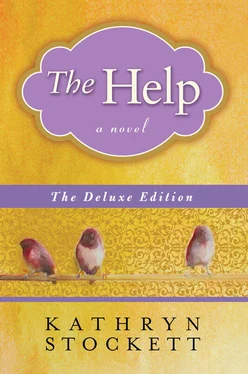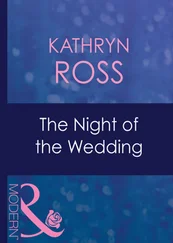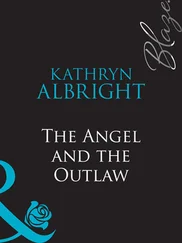I search through card catalogues and scan the shelves, but find nothing about domestic workers. In nonfiction, I spot a single copy of Frederick Douglass, an American Slave. I grab it, excited to deliver it to Aibileen, but when I open it, I see the middle section has been ripped out. Inside, someone has written NIGGER BOOK in purple crayon. I am not as disturbed by the words as by the fact that the handwriting looks like a third grader’s. I glance around, push the book in my satchel. It seems better than putting it back on the shelf.
In the Mississippi History room, I search for anything remotely resembling race relations. I find only Civil War books, maps, and old phone books. I stand on tiptoe to see what’s on the high shelf. That’s when I spot a booklet, laid sideways across the top of the Mississippi River Valley Flood Index. A regular-sized person would never have seen it. I slide it down to glance at the cover. The booklet is thin, printed on onionskin paper, curling, bound with staples. “Compilation of Jim Crow Laws of the South,” the cover reads. I open the noisy cover page.
The booklet is simply a list of laws stating what colored people can and cannot do, in an assortment of Southern states. I skim the first page, puzzled why this is here. The laws are neither threatening nor friendly, just citing the facts:
No person shall require any white female to nurse in wards or rooms in which negro men are placed.
It shall be unlawful for a white person to marry anyone except a white person. Any marriage in violation of this section shall be void.
No colored barber shall serve as a barber to white women or girls.
The officer in charge shall not bury any colored persons upon ground used for the burial of white persons.
Books shall not be interchangeable between the white and colored schools, but shall continue to be used by the race first using them.
I read through four of the twenty-five pages, mesmerized by how many laws exist to separate us. Negroes and whites are not allowed to share water fountains, movie houses, public restrooms, ballparks, phone booths, circus shows. Negroes cannot use the same pharmacy or buy postage stamps at the same window as me. I think about Constantine, the time my family took her to Memphis with us and the highway had mostly washed out, but we had to drive straight on through because we knew the hotels wouldn’t let her in. I think about how no one in the car would come out and say it. We all know about these laws, we live here, but we don’t talk about them. This is the first time I’ve ever seen them written down.
Lunch counters, the state fair, pool tables, hospitals. Number forty-seven I have to read twice, for its irony.
The Board shall maintain a separate building on separate grounds for the instruction of all blind persons of the colored race.
After several minutes, I make myself stop. I start to put the booklet back, telling myself I’m not writing a book about Southern legislation, this is a waste of my time. But then I realize, like a shell cracking open in my head, there’s no difference between these government laws and Hilly building Aibileen a bathroom in the garage, except ten minutes’ worth of signatures in the state capital.
On the last page, I see the pica type that reads Property of Mississippi Law Library. The booklet was returned to the wrong building. I scratch my revelation on a piece of paper and tuck it inside the booklet: Jim Crow or Hilly’s bathroom plan—what’s the difference? I slip it in my bag. Susie sneezes behind the desk across the room.
I head for the doors. I have a League meeting in thirty minutes. I give Susie an extra friendly smile. She’s whispering into the phone. The stolen books in my bag feel like they’re pulsing with heat.
“Skeeter,” Susie hisses from the desk, eyes wide. “Did I really hear you have been seeing Stuart Whitworth?” She puts a bit too much emphasis on the you for me to keep up my smile. I act like I don’t hear her and walk out into the bright sunshine. I’ve never stolen a thing in my life before today. I’m a little satisfied it was on Susie’s watch.
OUR PLACES Of COMFORT ARE expectedly different, my friends and I. Elizabeth’s is hunched over her sewing machine trying to make her life look seamless, store-bought. Mine is at my typewriter writing pithy things I’ll never have the guts to say out loud. And Hilly’s is behind a podium telling sixty-five women that three cans apiece isn’t enough to feed all those PSCAs. The Poor Starving Children of Africa, that is. Mary Joline Walker, however, thinks three is plenty.
“And isn’t it kind of expensive, carting all this tin across the world to Ethiopia?” Mary Joline asks. “Doesn’t it make more sense just to send them a check?”
The meeting has not officially started, but Hilly’s already behind her podium. There’s a franticness in her eyes. This isn’t our normal evening time, but an extra afternoon session Hilly’s called. In June, many of the members are going out of town for summer vacations. Then, in July, Hilly leaves for her annual trip down to the coast for three weeks. It’s going to be hard for her to trust an entire town to operate properly without her here.
Hilly rolls her eyes. “You cannot give these tribal people money, Mary Joline. There is no Jitney 14 Grocery in the Ogaden Desert. And how would we know if they’re even feeding their kids with it? They’re likely to go to the local voodoo tent and get a satanic tattoo with our money.”
“Alright.” Mary Joline teeters off, flat-faced, brainwashed-looking. “I guess you know best.” It is this bug-eyed effect Hilly has on people that makes her such a successful League president.
I make my way across the crowded meeting room, feeling the warmth of attention, as if a beam of light is shining down on my head. The room is full of cake-eating, Tab-drinking, cigarette-smoking women all about my age. Some are whispering to each other, glancing my way.
“ Skeeter, ” Liza Presley says before I make it past the coffee urns, “did I hear you were at the Robert E. Lee a few weeks ago?”
“Is that right? Are you really seeing Stuart Whitworth?” says Frances Greenbow.
Most of the questions are not unkind, not like Susie’s at the library. Still, I shrug, try not to notice how when a regular girl gets asked out, it’s information, but when Skeeter Phelan gets asked out, it’s news.
But it’s true. I am seeing Stuart Whitworth and have been for three weeks now. Twice at the Robert E. Lee if you include the disaster date, and three more times sitting on my front porch for drinks before he drove home to Vicksburg. My father even stayed up past eight o’clock to speak to him. “Night, son. You tell the Senator we sure do appreciate him stomping out that farm tax bill.” Mother’s been trembling, torn between the terror that I’ll screw it up and glee that I actually like men.
The white spotlight of wonder follows me as I make my way to Hilly. Girls are smiling and nodding at me.
“When will y’all see each other again?” This is Elizabeth now, twisting a napkin, eyes wide like she’s staring at a car accident. “Did he say?”
“Tomorrow night. As soon as he can drive over.”
“Good.” Hilly’s smile is a fat child’s at the Seale-Lily Ice Cream window. The button on her red suitcoat bulges. “We’ll make it a double date, then.”
I don’t answer. I don’t want Hilly and William coming along. I just want to sit with Stuart, have him look at me and only me. Twice, when we were alone, he brushed my hair back when it fell in my eyes. He might not brush my hair back if they’re around.
“William’ll telephone Stuart tonight. Let’s go to the picture show.”
Читать дальше












